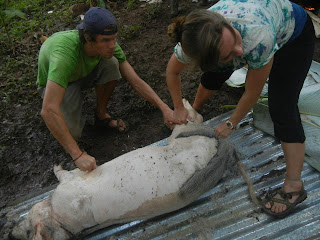1) Best Development Book:
"Pathologies of Power" -Paul Farmer
It is extremely rare to find a book that changes the way one sees the world. "Guns, Germs, and Steel" by Jared Diamond did that when I was in college; "Earth in Mind" by David Orr did that fresh out of college; now "Pathologies of Power" has done it in the Peace Corps. If you are concerned about poverty -this should be everyone- you must read this book. This book is in my all-time top three.
- Runner up: "Poor Economics" -Esther Duflo, Abhijit Banerjee
2) Best Fiction:
"East of Eden" -John Steinbeck
My favorite novel by one of my favorite authors. Some say his more famous "Grapes of Wrath" is the great American novel. To that I say "bah". "East of Eden" lingered in my mind longer and was more interesting. I think it's Steinbeck's masterpiece.
- Runner up: "Atlas Shrugged" -Ayn Rand
- Runner up: "Blindness" -Jose Saramago
- Runner up: "Confederacy of Dunces" -John Kennedy Toole
3) Best Writing:
"All the Pretty Horses" -Cormac McCarthy
Probably the most beautifully written book I've ever read. McCarthy is another favorite author of mine -the master of simple sentences. The way he can bring a setting to life is incredible.
4) Personal Experience:
"Animal, Vegetable, Miracle" -Barbara Kingsolver
By far my favorite book by Barbara Kingsolver. This is the story of her family's attempt to only eat food locally grown, much of it by them, for an entire year. It also features excerpts from her scientist husband and her daughter in college. Beautiful, educational, inspiring, and great recipes!
5) Best Non-Fiction:
"The Lost City of Z" -David Grann
The absolutely engrossing incredible true story of Pery Fawcett, a real-life Indiana Jones, only more badass. This reads like the most thrilling fiction.
- Runner up: "A People's History of the Unites States" -Howard Zinn
6) Best History:
"Cod" -Mark Kurklansky
This short history of cod is great. Cod, as much as I hate to admit it, is definitely America's fish. Cod was one of the reasons the American Revolutionary War broke out for gosh sakes. An infinitely more interesting history than I could have imagined. A must read for history nerds.
- Runner up: "Path Between the Seas" -David McCullough
7) Best Reporting:
"The Big Short" -Michael Lewis
Widely considered the best book about the recent US financial crisis, it explains complicated concepts a midst a surprisingly engrossing tale chock full of fantastic characters. Good luck putting this one down.
- Runner up: "Where Men Win Glory" -Jon Krakauer
"The Book of Basketball" -Bill Simmons
The best book I've read on the history of my favorite sport. I've followed Mr. Simmons' columns for a long time. He is a true fan and this book is a hilarious delight.
9) Best Peace Corps Chronicle:
"River Town" -Peter Hessler
A thoughtful and immensely reflective story. Hessler served in China in the 90's just after china re-opened it's country to the world. I learned a ton about China's history and culture. Most PC chronicles tend to be -unlike "River Town"- tragic and inspiring, full of painful and incredible stories. Most PCV's have an experience more like Hessler's. These other two great PC chronicles fall into the former category.
- Runner up: "The Ponds of Kalambayi" -Mike Tidwell
- Runner up: "Monique and the Mango Rains" -Kris Holloway
10) Best Collection of Short Stories:
"Interpreter of Maladies" -Jhumpa Lahiri
Lahiri's Pulitzer Prize-winning first book is also the best collection of short stories I've ever read -with the possible exception of "Unaccustomed Earth," her third book. Her understanding of the human condition -told through the experiences of Indian-Americans- is more real and honest than anything else I've read. I can't wait to read more from this perceptive author.
11) Best Collection of Poems;
"The Prophet" -Khalil Gibran
Gibran, the third best-selling poet of all time behind Shakespeare and Lao-Tzu, is most famous in the English-speaking world for, "The Prophet." First published in Lebanon in 1923, this collection of poems can be seen as Gibran´s guideline for living a good life, drawn from christian and sufism teachings and infused with Gibran´s values. If you are looking for spiritual guidance, this book is an equally beautiful alternative or supplement to the Bible.
11) Best Collection of Poems;
"The Prophet" -Khalil Gibran
Gibran, the third best-selling poet of all time behind Shakespeare and Lao-Tzu, is most famous in the English-speaking world for, "The Prophet." First published in Lebanon in 1923, this collection of poems can be seen as Gibran´s guideline for living a good life, drawn from christian and sufism teachings and infused with Gibran´s values. If you are looking for spiritual guidance, this book is an equally beautiful alternative or supplement to the Bible.









